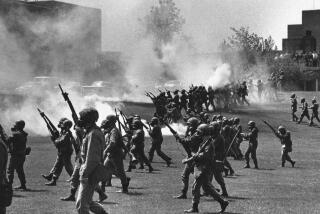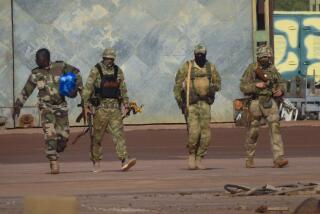Activists Probe Reported Killings in Chechnya
- Share via
MOSCOW — Human rights workers are collecting what they describe as mounting evidence that Russian troops committed unjustified killings and other abuses during military operations in two towns in separatist Chechnya over the last eight days.
Usam Baisayev, deputy director of the regional office of the Russian human rights group Memorial, said the first military operation began in the town of Tsotsin-Yurt on Dec. 30 and appeared to target Chechen men.
“The soldiers kept shooting at any Chechen male they saw for four days in a row,” Baisayev said from his office in the city of Nazran, on the border with Chechnya. “They did not even bother to figure out whether the person they were about to deprive of life is or was a member of a rebel gang.”
The operations began as Russia shut down for the country’s biggest holidays--New Year’s Day on Jan. 1 and Orthodox Christmas, which is observed today. Most newspapers stop printing during the period, and TV news broadcasts are reduced.
Russian military officials have issued perfunctory reports about the operations, saying the troops are rooting out rebels hiding among the civilian population. The official reports have said Russian troops “destroyed” 100 rebels, including several field commanders, during a “special operation” in Tsotsin-Yurt. They have not mentioned any detentions or arrests; officially, suspected rebels are supposed to be taken into custody during an investigation into their activities.
The second operation began in the town of Argun on Thursday to hunt down as many as 30 alleged rebels who may have escaped from Tsotsin-Yurt, according to official reports. No civilian was allowed into or out of Argun for a fourth day Sunday.
“The ring around militants is getting tighter,” Col. Gen. Georgy Shpak, commander of Russia’s paratroop force, told the Itar-Tass news agency Friday. “The troops are intensifying special operations because it is easier to fight militants in winter.”
Russian officials say the Federal Security Service, the main successor to the Soviet KGB, is overseeing the Argun operation along with military and civilian prosecutors. They have reported that 38 suspected rebels have been detained there.
“I have been there myself today,” Vsevolod Chernov, the chief prosecutor of Chechnya, said in an interview broadcast Sunday on the TV-6 network. “There have been no complaints from the people. Military and local prosecutors as well as representatives of the public--elders from the city of Argun--are taking part in the operation.”
Difficult to Verify Russian, Rebel Accounts
Information about events in Chechnya is often fragmentary and unverifiable because of poor communications and a lack of impartial observers. Most Russian news reports are based on official statements from military headquarters; the Chechen rebels’ Web site routinely exaggerates rebel gains. Information from other Chechen sources often takes days or weeks to trickle out, usually via residents who leave the republic on foot.
Kheda Saratova, an investigator with Memorial, spent three days in Tsotsin-Yurt before leaving Saturday and collected evidence that at least 37 civilians were killed by Russian troops. She said that in order to retrieve the bodies, relatives of the victims were forced to sign a statement acknowledging that their loved ones were members of rebel groups.
“Troops kill peaceful civilians and then try to pass them off as rebels,” she said in a telephone interview after reaching Nazran, in the neighboring Russian republic of Ingushetia. “The military just grab anyone who is at hand, and then the rest of the world has to trust their ‘professionalism’ when they say these people were bandits.”
Saratova cited the case of 37-year-old Musa Ismailov, a town mullah, who was taken away by Russian soldiers in Tsotsin-Yurt on Dec. 30. As the troops escorted him out the door, his 36-year-old wife, Malika, saw that one of his ears had been cut off and that he was bleeding from the wound. She tried to follow him, but a soldier threatened to shoot her. Later, to retrieve her husband’s body, she had to pay 1,000 rubles, or about $33, to federal troops and sign a document saying he had been a rebel fighter.
“This pretty much makes all members of our family fighters automatically,” the woman told Saratova, who transcribed the interview. “And now I am afraid . . . that my 17-year-old son will take up a gun and will try to avenge his father’s death. And I will not be able to stop my son. In fact, most of the people who are fighting against the federals today and whom the federals call bandits are ordinary people who want to avenge their relatives who were unjustly slaughtered by the federal troops.”
Theater Commander Reportedly Was Present
Saratova said residents reported that many of the Russian soldiers, perhaps because of New Year’s revelry, appeared to be drunk during the operations. She also said the troops had burned an unknown number of corpses on the town outskirts.
“The entire town reeks of burned flesh and putrefaction,” she said.
Saratova also said several residents reported seeing the commander of Russia’s troops in Chechnya, Lt. Gen. Vladimir Moltenskoi, in Tsotsin-Yurt during the operation. Moltenskoi was also commander during document sweeps, or zachistka operations, in the Chechen villages of Sernovodsk and Assinovskaya in July that were denounced as cruel and wanton even by pro-Kremlin officials in the region.
Chechens and human rights workers say Russia’s support for the United States’ anti-terrorism campaign in Afghanistan has had the side effect of quelling international criticism of continuing Russian misdeeds in Chechnya.
“Most of the reports coming these days from [Tsotsin-Yurt] sound very true,” said Andrei A. Piontkovsky, director of the Independent Institute for Strategic Studies. “Things that would several years ago make one’s hair stand on end today sound utterly commonplace.
“Because Russia has turned out to be a very useful and instrumental ally of the U.S. in fighting international terrorism, the West has completely turned a blind eye to what is happening in Chechnya . . . ,” he continued. “In the past, the West only meekly complained about large-scale human rights violations in Chechnya. After Sept. 11, even these complaints and humble criticism stopped. Now, everything is quiet, and Russia feels it has got a free hand to do whatever it wants with Chechnya.”
*
Alexei V. Kuznetsov of The Times’ Moscow Bureau contributed to this report.
More to Read
Sign up for Essential California
The most important California stories and recommendations in your inbox every morning.
You may occasionally receive promotional content from the Los Angeles Times.













